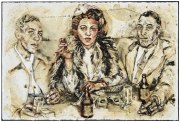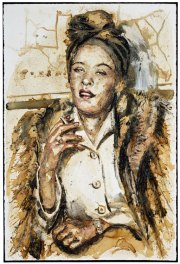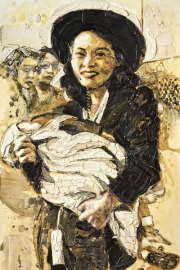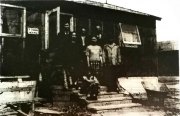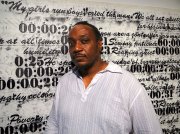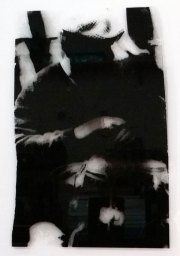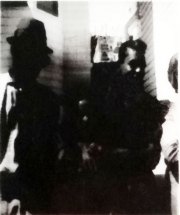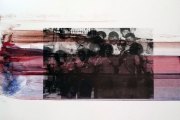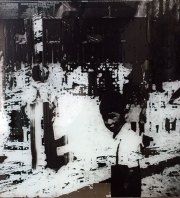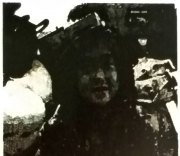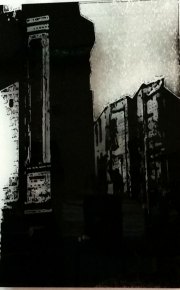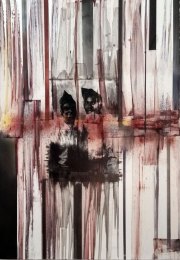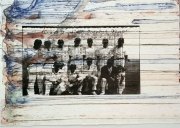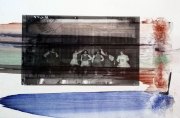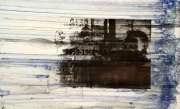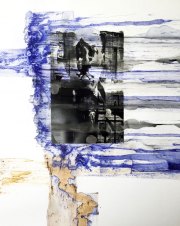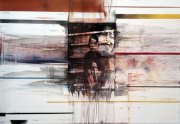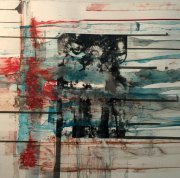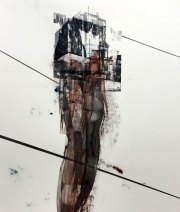Monica Lundy, Jack’s Tavern, 2016, 22k Gold, 16k Gold, 12k White Gold, Coffee, Mica Flake and Pulverized Charcoal on Arches Paper Mounted on Panel, 41 x 61 inches
Nancy Toomey Fine Art is pleased to announce an exhibition of works by Monica Lundy and Rodney Ewing entitled Untethered – Stories of the Fillmore District on view from October 1 to November 26, 2016. Nancy Toomey Fine Art is located inside San Francisco’s newest art complex Minnesota Street Project, 1275 Minnesota Street.

Rodney Ewing, The Home Team, 2016, Silkscreen and Dry Pigment on Paper, 40 x 29.5 Inches
With an interest in unearthing stories from one of San Francisco’s most historically diverse neighborhoods, Bay Area artists Monica Lundy and Rodney Ewing have come together to explore the history of the Fillmore District, and the people whose lives have intersected with it. Through extensive research into local archives and museums, Lundy and Ewing have combed through hundreds of archival photos and documents to find source material for paintings and mixed media works.
Lundy and Ewing’s exhibition focuses on images from the early to mid 20th century, when the Fillmore District was a Japanese neighborhood, through the Japanese Internment during World War II. As the Japanese left, the area became a thriving African American neighborhood and musical epicenter known as Harlem of the West, ultimately terminating with the Redevelopment Period that displaced the entire community and destroyed thousands of San Francisco’s oldest homes.

Monica Lundy, Mother and Child Tagged for Internment, 2016, 22k Gold, 16k Gold, 12k White Gold, Green Tea, Mica Flake, Gouache, Charcoal, Liquid Porcelain, and Acrylic on Arches Paper Mounted on Panel, 61 x 41 Inches
Ewing says, “Our work will focus on the Fillmore District’s history of displacement: Japanese Americans in the 1940s, African Americans in the 1960s. It will be in two parts: Trace Drawings, based on photographs of the homes that were destroyed and individuals who were displaced, will focus on the actions of being adrift and erased. Haint (ghost) Houses will be scaled down versions of the structures, constructed out of discarded building materials, suspended in space. The houses’ corporeal forms will be transparent, as if they are apparitions.”
“Place is more than just a geographic reference point, it holds our memories, establishes our identities, and is the foundation for our future,” says Ewing. “Without a person’s ability to establish roots, they become bystanders in their own existence. The concepts of departure, wandering, and disappearance have been part of African American culture since the Trans-Atlantic Slave trade. What happens if all physical trace of your ancestors has been removed? What do you call home?”

Rodney Ewing, Shadows, 2016, Silkscreen on Glass Window, 24 x 22 Inches
This body of work is an investigation into local history, racism, displacement, and destruction of community. From thousands of photos, Lundy and Ewing have selected images that illustrate a cross section of many facets of the lives and livelihood of people who existed on the periphery of white culture; people who were unable to put down roots in their homes and feel safe in their communities due to institutional bigotry and government sanctioned displacement.
Untethered – Stories of the Fillmore District is an extension of both artists’ individual practices: Lundy’s awareness of and curiosity about divisions in cultural and social perceptions, particularly in regard to women, and Ewing’s work that intersects body, place, and memory in order to create narratives more intimate than history texts. In 2015 they were awarded a San Francisco Arts Commission Grant for this project. The culmination of this is a series of mixed media paintings and installations based on extensive research into local archives, including the San Francisco Public Library’s Historic Photo Collection and the California State Archives.

Artist Monica Lundy, Photo by Richard Speer
Born in 1974 in Portland, Oregon, Monica Lundy spent her childhood between the United States and Saudi Arabia. Lundy received her Bachelor of Fine Arts from The School of the Art Institute of Chicago and her Master of Fine Arts from Mills College. She has installed a number of site-specific paintings around San Francisco, including Alcatraz Island, Fort Point, and the San Francisco Maritime Museum. Her work has been reviewed in ARTnews, The Huffington Post, and Visual Art Source, among other publications.

Artist Rodney Ewing, Photo by Alan Bamberger
Rodney Ewing is a San Francisco based artist who received his Bachelor of Fine Arts from Louisiana State University and his Master of Fine Arts from West Virginia University. Ewing’s drawings, installations, and mixed media works focus on his need to intersect body and place, memory and fact to re-examine human histories, cultural conditions, and events. His work has been in numerous group and solo exhibitions at, among others, Jack Fischer Gallery in San Francisco, the Berkeley Art Center, and the Drawing Center in New York City. In 2015 he was Artist-in-Residence at the de Young Museum.

